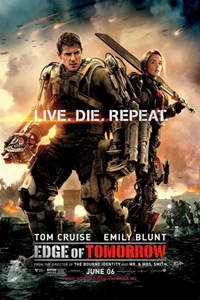 Edge of Tomorrow
Edge of Tomorrow
Edge of Tomorrow is intelligent, fun science fiction. Like a demented blend of Groundhog Day and Source Code, the film emphasizes the humor in repeating a single day from the former while also demonstrating the seriousness of solving a mystery with only a limited amount of time before things reset from the latter. It’s more original than that, though, due to its terrific use of gender role reversal alongside its kinetic, character-driven action. The film centers on a futuristic Earth that’s ravaged by an alien invasion, starting in Europe and leaving most global countries decimated. Officer William Cage (Tom Cruise), a spokesman for the war effort, insists with others that deliberate action and strategy against the aliens will lead to their success, yet they continue to fail. Cage is approached by General Brigham (Brendan Gleeson), a leader of the United Forces that guides the world’s concentrated effort against the aliens. He tells Cage they are planning an attack tomorrow, and Cage will be leading the charge. He’s never been in battle, let alone led an army. After attempts to blackmail and escape Brigham, Cage wakes up in handcuffs at the battlefront.
Cage is a man who sells things, working for an advertising agency and participating in ROTC in high school. He can sell what the military does. Officers in the field, though, are not impressed by his actions, with Master Sergeant Farell (Bill Paxton) even saying that Cage would attempt to escape if given the chance and is a deserter. When he is forced into battle, he is ill-equipped and sees a coordinated attack go to waste when the aliens thwart their every move. It’s as if they knew what was coming, a soldier says. Cage is killed in combat after executing an Alpha, which sprays acid over his face and body, ending his life quickly. Then Cage wakes up. Again. He keeps entering the battle, more and more confused, leading to his death and their loss every time. He’s in a time loop, which a Special Forces officer named Rita (Emily Blunt) notices, using this opportunity to prepare themselves for victory every time he wakes back up. Yet the aliens are smarter than they can imagine, and the familiarity of the situations and increasingly difficult circumstances take a toll on Cage’s psyche.
Cruise is playing a role largely devoid of action hero stereotypes, which is refreshing in the landscape of similar summer blockbusters. He has always been a charming screen presence, one that has had his public image torn apart due to personal affairs left for the media to judge. But that doesn’t take away from his talents on screen, where he can sell a plot much like his character and make an audience care about the situation at hand. The film shines even more, though, when Rita controls the action. She is affectionately coined the “Full Metal Bitch,” which Cage sees every time he wakes up, often to increasingly comedic effect. Blunt is outstanding in the role because she shows that she is made for any genre, so long as the role is strongly written and orchestrated. She fits the action heroine perfectly because the film provides her with stronger development than most traditional leads. She is masculinized in every way: the story provides her with the troubled emotional backstory usually held for stoic men; she is the more experienced warrior that knows how to survive in battle; and she even has her wounds tended to by a man, something usually reserved for passive romantic interests.
The plot is fairly straightforward for a time travel science fiction tale, although the ending leaves a bit to be desired in terms of dramatic impact. The film succeeds when it grounds the characters in the context of the story and surrounds them with action, not the other way around. That’s a testament to the writing as well as Doug Liman’s direction. In previous efforts like The Bourne Identity and Mr. and Mrs. Smith, he develops strong scenarios in which the characters logically exist. He doesn’t provide mindless action without context. Edge of Tomorrow also stands as an allegory, however basic, for the way war trivializes human life. Cage is put into battle without preparation and it leads to his death; he’s lucky to have a chance to relive the battle, because plenty of soldiers never come back from concentrated war efforts. The film isn’t made to be a staunch metaphor for militarization or anything of the sort. It’s made to blow stuff up really well. Which it does, alongside a twisty plot, well-developed characters, and effectively paced action. It’s a surprisingly exciting actioner.









